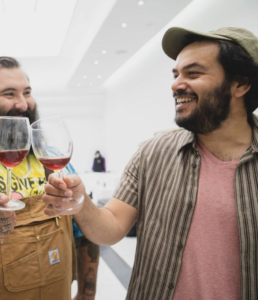
Eli Silins makes wine, but he shies away from the title “winemaker.”
Instead, he jokes, he prefers “wine steward” or “microbial community organizer.”
“I’m not the one making the wine,” Silins said. “I’m trying to facilitate conditions where yeast can make wine.”
Whatever his title, Silins, 37, is the boss and brain behind Camuna Cellars, a Northeast Philadelphia-based winery that sources grapes, apples, pears and honey from within 300 miles. The natural wine, cider and mead that Silins produces also happens to be kosher and is supervised by the West Philadelphia-based Green Mountain Kosher.
Since finding its home in 2019, Camuna Cellars has put its libations on the shelves of bottle shops in Philadelphia and New York and on menus at Zahav, Laser Wolf, Vernick and Martha.
Silins, who is Jewish, is aware of the stereotype around kosher wines — that they are either saccharine and one-note or near-vinegar. Instead of focusing on the hechsher, he’s mostly concerned with just trying to create a good product, and one that comes from sustainable and regenerative practices. He’s guided by the Jewish practice of stewarding
the land.
“It’s very clear that we are here as partners in creation — to till and to tend, l’avdah uloshomrah — that if you [screw] it up, nobody’s going to be here to clean up your mess after you,” Silins said, using stronger language.
Silins sources his grapes from South Jersey; his apples, pears and honey are from Chester and Lehigh counties, and all have been farmed without insecticides or pesticides. Camuna Cellars avoids using additives like commercial yeast to stabilize the wine or alter the flavor of the ingredients.
As a result, Silins can’t always guarantee how his product will turn out or if he’ll be able to bottle the fruits of his labor for commercial consumption. Silins’ Jewish principles of being a facilitator, not a creator, in the winemaking process, guide the more laissez-faire mindset.
“The grapes might turn into wine without me, or they might turn into vinegar,” he said.
The philosophy Silins takes means he remains humble in his role in the winemaking process, but his extensive training in the industry suggests greater prowess.
Catching the winemaking bug from a stint at a biodynamic winery in Australia in 2004, Silins — who always had a love for agriculture — later found himself as the intern for the kosher Covenant Wines in Napa Valley, California, in 2013. Silins went on to become the winery’s cellar master a year later, a position he stayed in until his move to Philadelphia.
If anything, Silins considers his experience in Australia an outlier, with his true path to winemaking much more meandering.
Growing up in a Conversative Jewish family outside of Chicago, Silins had a strong Jewish upbringing and education but a dissonance with his Jewish identity. His time at the “hippy-dippy” Prescott College in Arizona, where students practiced Buddhism and spent time at the nearby Hopi reservation, didn’t leave Silins with his spiritual itch scratched, either.
He moved back to Chicago and lived in — what Silins best describes as — a commune, sharing a home with young Jews who kept kosher and observed Shabbat. In the early days of the resurgence of the Jewish farming movement, one resident learned that their grandmother had bought land in California in the 1960s, prompting some members of the group to move to the West Coast.
After over six years at Covenant, where Silins learned the ins and outs of kosher winemaking, the financial burden of living in California began to take its toll. Silins and his partner relocated to Philadelphia, where his partner was from, to raise a family and take stock of the diverse Jewish community Philadelphia had to offer.
Silins previously started Camuna Cellars in 2018 in Berkeley but had to start the project from scratch upon moving to Philadelphia. His in-laws own a warehouse in Northeast Philadelphia, where Silins began making wine in a 240-square-foot room. Buying equipment, finding suppliers and working with Pennsylvania produce proved a slow process.
“I have experience making wine, but then I moved here and thought I knew what I was doing,” Silins said. “It’s a totally different thing on the East Coast, but I’m figuring it out.”
As Silins navigates the changing climate and ingredients that shape the wine he’s helping to create, the foundation of his work remains the same. Silins gave up on trying to control his environment and end product years ago when he began the winemaking journey. All that remains is his commitment to the process, which he finds nothing short of sacred.
“I have said Camuna kind of became my spiritual practice,” Silins said, “in a way of trying to embody my values in something physical.”






